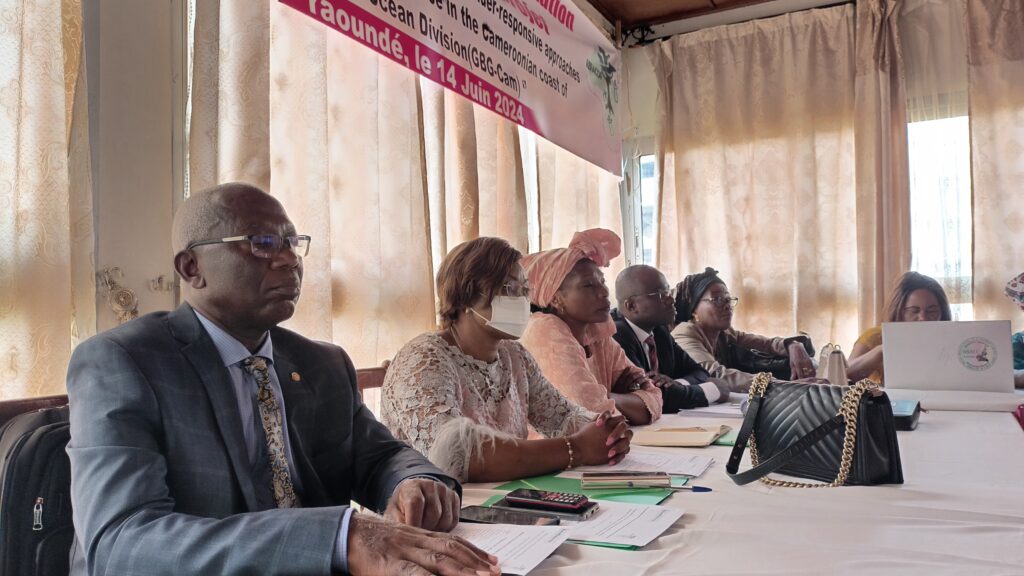The National Stakeholders workshop was held on 14 June in Yaounde, Cameroon, and was organized by The African Women’s Network for Community Forest Management (REFACOF) in collaboration with Women4Biodiversity. This workshop aimed to share the existing legal overview conducted by the REFACOF team and the restoration work done in Londji with the Association des Femmes pour la Protection et la Conservation de la Mangrove (Association of Women towards Protection and Conservation of Mangrove). The meeting was attended by civil society groups and various government dignitaries, including those from the Ministry of Environment, Nature Protection and Sustainable Development (MINEPDED) as well as the National Focal Points for the Convention of Biological Diversity, Nagoya Protocol, and Cartagena Protocol.
The session began with a message from Joséphine Thérèse B. Eloundou, National Focal Point for CBD. She highlighted Cameroon’s varied ecosystems and how integral women’s roles are within biodiversity conservation, especially in building resilience. Onana Hortense, Consultant of REFACOF, presented the legal brief that was carried out and updated, which overlooked Cameroon’s various biodiversity and gender laws that shed light on the status of the gender-responsive policy. Health and Education are the only two sectors that, in the current context, have any links to gender-sensitive policies, including gender budgeting. Concerning the National Biodiversity Laws, while there are some gender-responsive mechanisms, they are not enough or clear enough for its implementation. While there are plans within the financial budget that reflect gender budgeting, these are sometimes not implemented or are diverted for other activities.
Cameroon’s National Biodiversity And Strategic and Action Plans (NBSAPs) second version, published in 2012, already had Gender Mainstreaming as part of their overall target under Target 19 and also included it within their defined mission for 2020, which states, “Take all necessary measures to reduce the rate of national biodiversity loss and ensure long-term sustainability of critical ecosystems in order to guarantee by 2020 the continuous contribution of biodiversity and other ecosystem services to wealth creation including through mainstreaming, capacity building and funding biodiversity that is driven by a strong partnership with the involvement of indigenous and local communities and a focus on gender as a guarantee for future generations” [1]. With these as the base for Cameroon, it was pivotal that gender be one of their prime focus while updating their NBSAPs to reflect the Kunming-Montreal Global Biodiversity Framework (GBF).

The National Focal Point reflected that Cameroon has built a committee with Experts to develop a draft revised NBSAP. The NBSAP, once revised, will be available for public consultation. As part of the revisions, the committee have decided to have five key strategic axis points based on which they are fixing their overall priorities,-
1. What has more weightage for biodiversity?
2. How to restore degraded land (target of 12000 Ha to be restored)
3. Developing mechanisms for evidence building and information
4. National plan for governance and management of natural resources, and
5. Enabling more domestic sources of funding for biodiversity-related activities. These have led them to finalize 26 national “measures” [2]. Each of these measures combines one or more Targets and Goals within the GBF. They have already included a Gender and Biodiversity focal point housed within the MINEPDED and the Ministry of Women’s Empowerment and Family that focuses on biodiversity, gender, and climate change activities.
The community members from Londji also shared their concerns and achievements towards the Mangrove Restoration. With community members dealing with the impact of climate change, more floods are taking place on the coastline, and rising sea levels have also impacted restoration work. Invasive alien species like Nypa Palm are drying out the mangrove ecosystems, causing large-scale erosion of the region. A government representative from the Ministry of Territorial Administration (MINAT) stressed the importance of mangrove restoration, as they found that incidences of sea erosion have increased over time on the Cameroon coastline. The community members insisted on income-generating activities to continue their restoration work, further strengthening their region and livelihood security. Mr Rigobert Ntep, NFP-CP, MINEPDED, commented that it is pivotal to highlight activities that consider the traditional knowledge of local communities within the management plans. Various biodiversity-related and carbon-financed interventions must include local communities and help develop sustainable plans for using and accessing natural resources.
The National Stakeholders workshop ended with Government dignitaries ensuring follow-up action after sharing the recommendations from this dialogue and reporting them during their upcoming meeting within the MINEPDED.


Sources
[1] As mentioned in the NBSAP Version II accessed from https://www.cbd.int/doc/world/cm/cm-nbsap-v2-en.pdf
[2] The Committee have decided to call them measures instead of targets to ensure that there are processes that are being developed for the achievement of the GBF targets.
About the author

Shruti Ajit is the Programme Officer at Women4Biodiversity. She manages 6 women-led restoration projects in 6 restoration sites across Asia, Africa, Latin America, and the Solomon Islands. Shruti’s career centres on researching and documenting community-led conservation. Her past work involved challenging exclusive conservation narratives by pushing for inclusive policies and evidence at the national and regional levels. Shruti also serves as an advisory member of India’s Global Youth Biodiversity Network (IYBN), promoting youth engagement in biodiversity conservation.


